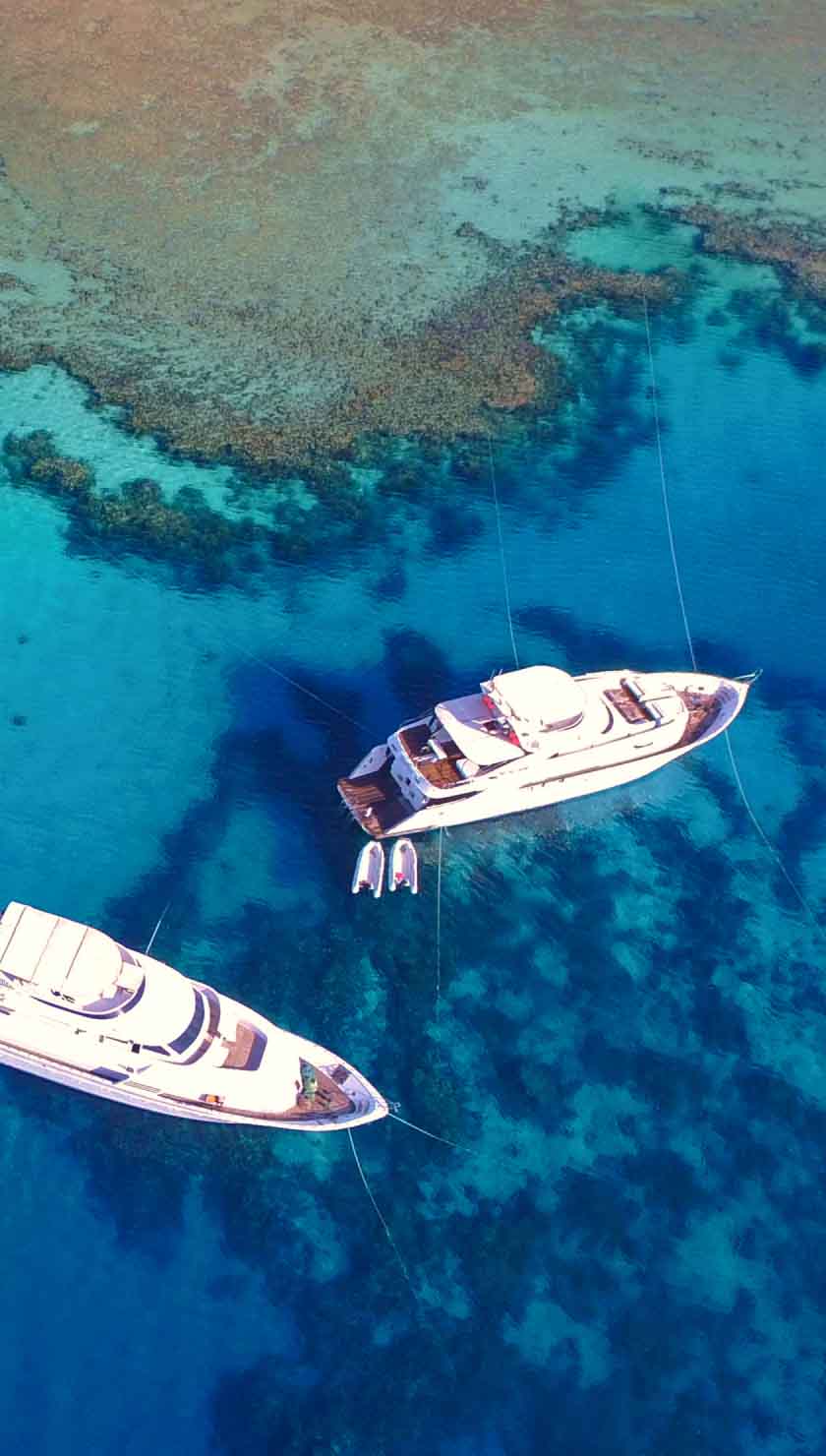Sailing in Micronesia means exploring Islands covered in flourishing forests, surrounded by turquoise waters and white beaches, this is truly a paradise for everyone. With thriving reefs, mystical wrecks and a large variety of impressive marine life, this is the perfect place to explore on a liveaboard; it will give you a chance to see a lot of the dive sites while always having comfortable, convenient accommodation. Deciding to take a liveaboard trip around the Palau area of Micronesia will allow you to dive with Manta Rays at the German Channel, swim with millions of jellyfish in Jellyfish Lake, explore the caves at Chandelier caves and drift dive with some of the largest schools of fish in the world at Blue Corner. If wrecks are what you are most interested in, then boarding a liveaboard going to Chuuk/Truk lagoon will provide you with an incredible assortment of wreck dives, all from WWII.
There are a selection of liveaboard dive tours which go around Micronesia which you can learn more about and book via LiveAboard.com. They vary in length from 52m (170ft) down to a smaller size of 20m (65ft) and the amounts of guests on board range from 22 down to 16. Each liveaboard has its own extras such as wifi, which sometimes comes at an extra cost, so please check this before booking.
The liveaboards generally leave from the port, on the first day, in the morning or early afternoon. The first dive which will be done is usually a check dive, just for the staff to get to know you as a diver and also give you chance to check your buoyancy and equipment. This will be done in a calm dive site, which in Micronesia will still be a beautiful site. Once the staff have gotten to know you better as a diver, then they, along with the captain, will be able to decide better on which dive sites are best suited.
It is important to note that all liveaboard itineraries can be subject to change depending on dive levels and weather conditions. Whatever happens, the final decision is always with the captain.
Dive Sites And Areas Of Micronesia
There are two main areas that the liveaboards visit, Palau, where the famous Rock Islands are located, and Chuuk/Truk Lagoon which is filled with World War II wrecks and artefacts. There are many popular dive sites in these areas.
PALAU: is on many divers bucket list of dive areas to visit, and rightly so. Here you can find such dive sites as Iro Maru Wreck, Peleliu, German Channel and the famous Blue Corner.
BLUE CORNER: An environmental corner located in the South West reef of the Rock Islands and is mostly known for being a top drift dive spot due to its strong currents. These currents are what makes the reef there flourish and inhabit some of the largest schools of fish in the world. This dive site has been voted best in the world in the past.
GERMAN CHANNEL: A channel created by the Germans, who needed to transport phosphorous from the lagoon to the ocean, in the early 1900's. The south west mouth of the channel is where the dive site is located and it is one of the best spots in the world to see Manta Rays, definitely an exceptional experience.
IRO MARU WRECK: The most famous wreck dive in the Palau area; sunk in 1944 this Japanese ship has created its own coral jungle filled with fish of all shapes and sizes and is home to many species of shrimp.
JELLYFISH LAKE: Swimming and snorkelling through millions of jellyfish without stingers, that is the experience this isolated lake on the island of Eil Malk in Palau will give you.
CHANDELIER CAVES: Caves filled with stalactites and stalagmites which sparkle like chandeliers could be a cave divers fantasy. A group of five cave systems which are great for explorations.
TRUK LAGOON: or also known as Chuuk Lagoon, An old Japanese naval base in WWII, more than 60 ships and 200 aeroplanes went down here, which has created around 50 wreck dive sites. If you are looking to dive with wrecks, it can't get much better than this.
When To Go
There are three main seasons, the high season runs from December to March and during this time there are flat, calm seas and drier weather, the shoulder seasons are April, July and August, October and November when where the winds are stronger and more rainfall, and lastly the low season, May, June and September where the weather fluctuates the most, but during these months there are the least amount of visitors and lowest prices. Many of the dive sites have specific requirements, such as needing to be a wreck diver or cave diver, so please do check before going.
Tips For Travellers
Because Micronesia is connected with the United States, they speak English all around. However, there are around 11 local languages in Micronesia. They also use the US dollar as currency.
Most liveaboards will have equipment for rent, however bringing your own will save renting costs and is always more comfortable. The staff will need to be sure about your dive experience so remember to bring along your log book and certification cards.
The electricity voltage here is 120 V and the plug type they use is A/B; flat double prong, so remember to bring adaptors with you for your electrical appliances if needed.
How To Get There And Ports Of Departure
There are two areas from which liveaboards depart from; Malakal Harbour in Koror and Weno Harbour. Both Koror and Weno have their own international airports. Koror is the largest city in Palau and the airport is located on the island of Babeldaob which is connected by a bridge to Koror. The airport is called The Roman Tmetuchl International Airport. There are only five destinations which have outgoing flights to Palau, so you would have to fly to one of these first; Philippines, Taiwan, South Korea, Japan and Guam. Weno has an international airport called Chuuk International Airport. There are only three airlines which fly to Chuuk, with the main route being via Guam from Honolulu with United Airlines.
Considerations
The prices of the liveaboards vary from US$286-US$436 per day, and boats of different sizes and amounts of customers.
Regarding visas, most nationalities receive a 30-day visa on arrival, and US citizens receive a one-year visa. Do make sure your passport is valid for at least 120 days more after the date of arrival.
There will be extra charges for Marine Park fees, Taxes and Port taxes for the liveaboards, so please do keep this in mind and check this before signing up.
The dive sites which each liveaboard visits differ, and so they will require different levels of diving. This ranges from Open Water (which will always be the minimum requirement) without any number of logged dives, up to Advanced Open Water with 50 logged dives. So please also keep this in mind.











